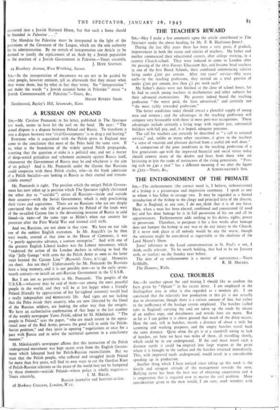A RUSSIAN ON POLAND
SIR,—Mr. Czeslaw Poznanski in his letter, published in The Spectator last week, seems to have hit the nail on the head. He says: "The actual dispute is a dispute between Poland and Russia. To transform it into a dispute between two 'rival Governments' is to drag a red herring."
Everyone who is acquainted with the Polish press in England may come to the conclusion that most of the Poles hold the same view. If so, what is the foundation of the widely spread Polish propaganda, asserting that the question at stake is a political one, and not a matter of deep-seated prejudices and vehement animosity against Russia itself, whatsoever the Government of Russia may be and whichever is the aim of its policy? And is Mr. Poznanski under the illusion that Russians could cooperate with those Polish circles, who—in the frank admission of a Polish Socialist—are looking at Russia as their eternal and irrecon- cilable enemy?
Mr. Poznanski is right. The position which the emigre Polish Govern- ment has now taken up (a position which The Spectator rightly christened the other day as "suicidal ") unites all Russians—inside and outside their country—with the Soviet Government, which is only proclaiming their views and aspirations. There are no Russians who are not deeply convinced that the sole title of possession by Poland of the lands west of the so-called Curzon line is the devastating invasion of Russia in cold blood—in 1920—of the same type as Hitler's when our country lay prostrate after the First World War and internal civil strife.
And we, Russians, are not alone in that view. We have on our side one of the noblest English statesmen. In Mr. Asquith's (as he then was) words, uttered at that time in the House of Commons, it was "a purely aggressive advance, a wanton enterprise." And with one of the greatest English Liberal leaders was the Labour movement, which "endorsed the action of the London dockers in refusing to load the ship 'Jolly George' with arms for the Polish Army as soon as the latter went beyond the Curzon Line" (Reynolds News, 9/1/44). Memories are short. Are not they? Unfortunately for Mr. Poznanski the Russians have a long memory, and it is not possible now—as in the early seven- teenth century—to install an anti-Russian Government in the U.S.S.R.
But I am not as pessimistic as Mr. Poznanski. The peoples of the U.S.S.R.—whatever may be said of them—are among the most peaceful people in the world, and they will be at last happy when a friendly Poland (friendly by appreciation of her far-sighted interests) would lead a really independent and Itlemocratic life. And signs are not lacking that the Poles inside their country, who are now liberated by the blood of the Russian soldiers, are looking the other way than the emigres. We have an authoritative confirmation of that hope in the last number of the weekly newspaper Yutro Polski, edited by M. Mikolajczyk. "The people in Poland," says the paper, "who are much nearer to the opera- tional zone of the Red Army, possess the good will to settle the Polish- Soviet problem," and they insist in opening "negotiations at once for a pact with Russia and to solve the territorial question in a conciliatory manner."
M. Mikolajczyk's newspaper affirms that this instruction of the Polish underground movement was kept secret even from the English Govern- ment which laboured hard for Polish-Russian reconciliation. But we trust that the Polish people, who suffered and struggled inside Poland for more than five years, will find its own ways to cut the Gordian Knot of Polish-Russian relations so the peace of the world may not be hampered by those elements—outside Poland—whose policy is wholly negative.—
Yours sincerely, I. M. BILLIR,


























 Previous page
Previous page